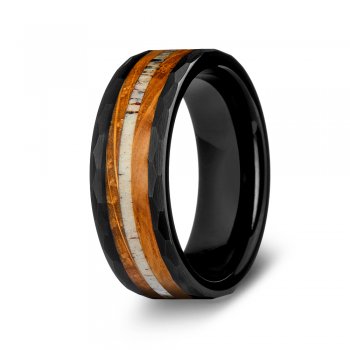Men's rings have undergone a remarkable transformation throughout history. Initially serving as symbols of power and status, these accessories have evolved into essential elements of modern fashion. This article delves into the rich history, styles, and significance of men's rings, providing insights for enthusiasts and casual wearers alike.

Historical Significance of Men's Rings
In ancient civilizations, men's rings were often used as seals or tokens of authority. For instance, the signet ring was a powerful emblem, used to stamp documents and signify ownership. These rings were typically made from precious metals and adorned with intricate designs, reflecting the wearer's social standing.
- Ancient Egypt: Rings were often inscribed with hieroglyphics, symbolizing protection and power.
- Roman Empire: Men wore rings to display their rank and wealth, often featuring family crests.
- Medieval Europe: Knights wore rings as symbols of loyalty and allegiance.
As time progressed, the significance of men's rings shifted from purely functional to more decorative purposes. However, their connection to identity and status has remained a constant theme.
Modern Styles of Men's Rings
Today, men's rings come in a variety of styles, materials, and designs, catering to diverse tastes and preferences. Some popular categories include:
- Wedding Bands: Often made of gold, platinum, or titanium, these rings symbolize commitment and love.
- Fashion Rings: These rings are designed for aesthetic appeal and can feature gemstones, unique shapes, and intricate patterns.
- Signet Rings: A modern twist on a classic, these rings often showcase personal engravings or family crests.
- Statement Rings: Bold and eye-catching, these rings are designed to make a statement and express individuality.
When selecting a ring, consider the occasion and personal style. Whether for a wedding, a special event, or everyday wear, the right men's ring can enhance any outfit.
Materials Used in Men's Rings
The materials used in crafting men's rings have expanded significantly. While traditional metals like gold and silver remain popular, contemporary designs often incorporate:
- Titanium: Known for its durability and lightweight properties.
- Stainless Steel: A cost-effective option that offers a modern aesthetic.
- Wood: Unique and eco-friendly, wood rings are gaining popularity.
- Carbon Fiber: Lightweight and strong, ideal for a sleek, modern look.
Each material offers distinct advantages, allowing wearers to choose based on their lifestyle and preferences.
Choosing the Right Men's Ring
When selecting a men's ring, consider the following factors:
- Size: Ensure a proper fit for comfort and wearability.
- Style: Choose a design that reflects your personality and complements your wardrobe.
- Occasion: Consider the purpose of the ring, whether it's for daily wear or a special event.
For a wide selection of high-quality men's rings, visit  . Their collection features a variety of styles and materials, perfect for any occasion.
. Their collection features a variety of styles and materials, perfect for any occasion.
In conclusion, men's rings have evolved from ancient symbols of power to modern fashion statements. Understanding their history, styles, and materials can help you make informed choices when selecting the perfect ring. Whether for personal expression or as a meaningful gift, men's rings continue to hold significance in today's world.








